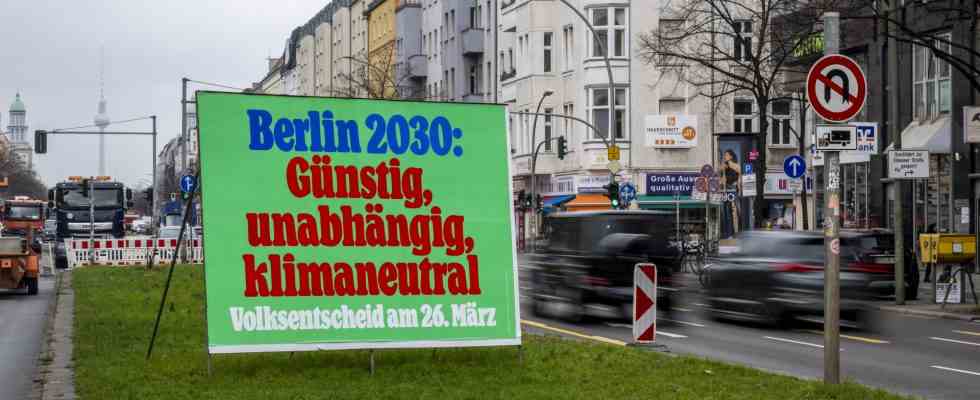Status: 03/26/2023 04:02 a.m
In Berlin, the polling stations have reopened. Millions of Berliners can decide whether Berlin should become climate neutral as early as 2030. But do they really?
The referendum “Berlin 2030 climate-neutral” faces several challenges. The first arises from the Berlin Voting Act. In order for Sunday’s referendum to be successful, not only must more people vote “Yes” than “No” – it is also necessary that at least a quarter of all eligible voters agree to the referendum’s concerns.
Expressed in numbers: More than 600,000 Berliners must be happy that Berlin is becoming climate-neutral 15 years faster than originally planned.
Law comes into effect immediately
Once that is done, a law will be rewritten at the same time: the so-called Energy Transition Act. “Climate protection targets” would be “climate protection obligations”, previous deadlines would be pushed forward. Berlin would have to reduce its emissions by at least 95 percent by 2030 compared to 1990 levels.
Many believe that this goal is unattainable – even those who are supposed to implement it. The Berlin Senate has already stated in its statement that although it welcomes the basic intention of the referendum, it considers the achievement of the goal to be “unlikely”. Among other things, the Berlin government argues that important framework conditions are not set at state level, but at federal and EU level. Berlin cannot simply become climate-neutral earlier than everyone else.
No sanctions provided for violations
So how much do new climate protection deadlines achieve on paper if politicians consider them unrealistic? Probably not much in the short term, because sanctions are not planned for the time being.
The initiative explains that rbb under time pressure: “Formulating a legally effective sanction mechanism is legally not entirely trivial,” says Stefan Zimmer from the Climate New Start initiative. The lead times for a referendum are very long, further delays should not be risked. The initiative therefore sees the ball in politics, the Senate should come up with sanctions itself.
The administrative lawyer Christian Pestalozza describes this procedure as a “fixed solution”. At the same time, however, he understands the dilemma. For example, it is difficult to impose fines on the Senate in such a case. But even if politics cannot be punished directly at first: If there is a deadline in the law and too little is happening in terms of climate policy to meet it, then the state government is threatened with lawsuits.
The climate judgment of the Federal Constitutional Court is an example of this: around two years ago, parts of the Climate Protection Act were declared unconstitutional and the legislature had to make improvements. But Pestalozza only expects lawsuits in the long term. It is not enough to accuse the Senate of inaction three months after the law came into force.
Record donation amount
But one thing is also certain: the referendum has created momentum. The campaign is extremely visible. Posters on 7000 lanterns, 650 large stands. Only the major Berlin parties have recently been able to campaign on this scale.
In fact, with a total of 1.2 million euros, the initiative even has a larger budget at its disposal. The CDU and FDP each had about one million euros for the election campaign, the AfD 500,000 euros. And among the Berlin referendums, the amount donated is a record.
Much of the money comes from the US. The German-American investor couple Albert Wenger and Susan Danziger from New York alone managed to raise 475,000 euros. They feel like they dem rbb say that Berlin could become a global role model, like Oslo, Paris or Rome. The couple denies financial interests, as do the major German donors, who have close ties to the renewable energy sector. Some of these donors could definitely benefit because they invest in funds that promote green technologies, for example.
Physicist Paul Grunow, for example, who is also active in the climate industry, emphasizes that he made a donation out of conviction, but also says: “I believe in green growth. I believe that capitalism will manage this conversion quickly.”
Broad alliance behind the initiative
There is also a lot of support on the street. According to the initiative, up to 2,000 volunteers helped with weddings – especially, but not only, in the inner districts of Berlin. Many already have experience with campaigns, for example they are practiced as party members in putting up posters or work in communication for start-ups and NGOs.
In addition, there is a broad alliance behind the initiative: In addition to Fridays for Future, Omas for Future, and Psychologists for Future, parties such as the Piraten Berlin, the Green Youth and Volt as well as aid organizations such as Brot für die Welt support the referendum. In an interview, the initiative reports that it is networked with similar climate protection projects throughout Germany.
This shows that despite the legal and practical hurdles for the referendum, faster climate neutrality is already desirable for parts of the population and the economy. Even if Berlin does not meet the commitments by 2030 in a successful referendum, this pressure seems to have reached politics: As part of their coalition negotiations, the SPD and CDU recently announced that they would invest five billion euros in climate protection. He is a core issue for Berlin.
Climate referendum in Berlin
Angela Ulrich, ARD Berlin, March 26, 2023 at 6:26 a.m

